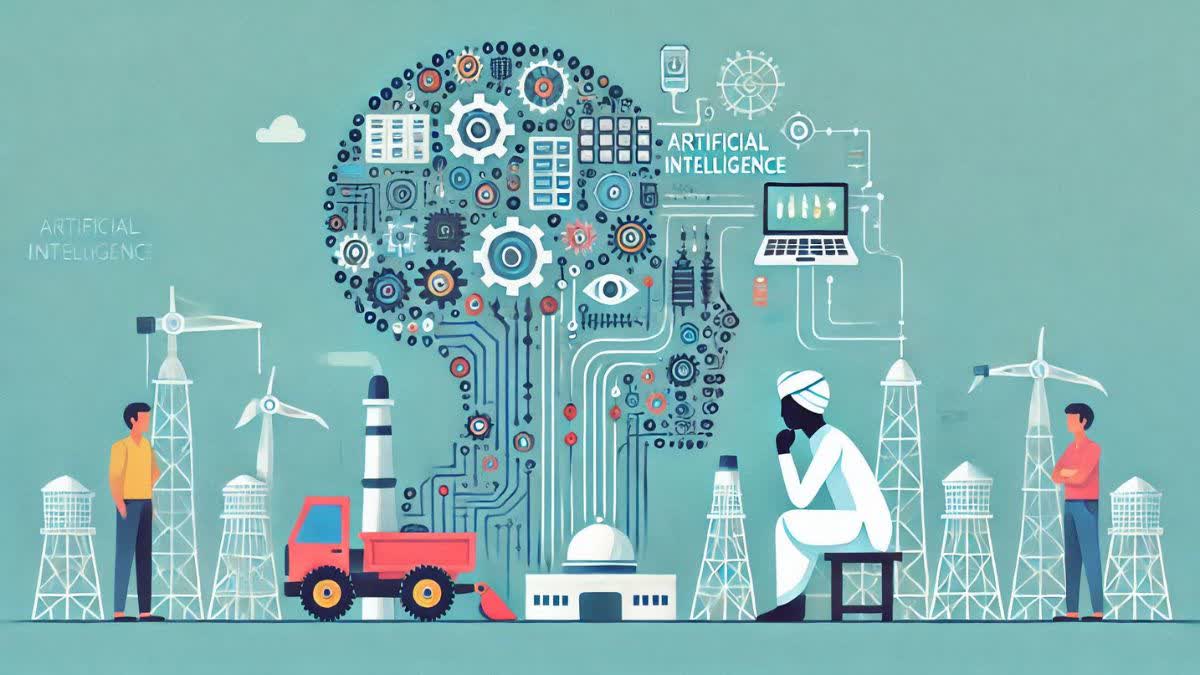New Delhi:As we stand on the cusp of a new era, the world is being reshaped by transformative technologies like Artificial Intelligence (AI), robotics, biotechnology, and quantum computing. This new phase, often called the "Intelligent Age," promises to redefine the ways in which we live, work, and interact with the world. The potential to address global challenges and unlock unprecedented opportunities is immense, but it requires collective effort and strategic foresight. India, with its growing economy and commitment to digital innovation, is positioned at the heart of this transformation.
India's Economic Position in the Intelligent Age
India is currently the fifth-largest economy globally, with a Gross Domestic Product (GDP) nearing $4 trillion. It has experienced robust growth, maintaining a stable rate of 7-8 per cent, despite global uncertainties. This growth trajectory, combined with deepening economic reforms, a strong demographic dividend, and an expanding consumer base, makes India a key player on the global economic stage.
India's advancement in the digital space has been particularly remarkable. The country's rapid strides in Digital Public Infrastructure (DPI) have set a global example, showcasing how technology can be harnessed for economic growth and development. However, to sustain this growth and lead in the Intelligent Age, India must continue to prioritise investments in next-generation infrastructure, particularly in AI, semiconductors, and quantum computing.
Dr Karnnika A Seth, Advocate & Cyberlaw Expert told ETV Bharat, "AI is being leveraged in agriculture, healthcare, smart cities, and various other sectors. India is certainly a world leader in the creation of AI and its deployment. We are mindful of the fact that AI needs to be adopted responsibly, and our policies reflect this in the blueprint. The proposed Digital India Act focuses on regulating high-risk systems and facilitates innovation through minimum regulation on low-risk AI systems. In my personal view, a separate AI law will need to be enacted. To that end, I voluntarily drafted a proposed AI law for India in support of the G20 summit in India."
India's Vision for AI and Technology Regulation
India's approach to AI is multifaceted, balancing innovation with ethical considerations and responsible deployment. The government’s commitment to responsible AI use is reflected in its policy frameworks, such as the Digital India Act, which aims to regulate high-risk AI systems while encouraging innovation in low-risk areas. As Karnika highlighted, the development of a distinct AI law for the country is vital to ensure that AI technologies are aligned with India’s broader socio-economic goals.
India's focus on developing regulatory frameworks that encourage innovation while minimising risks has positioned it as a leader in the global AI space. The proposed regulations around AI aim to address critical issues such as data privacy, accountability, and bias while fostering a conducive environment for AI startups and enterprises to thrive.
India's Strategic Technological Advantages
One of India's key strengths in the Intelligent Age is its vast population, which generates massive amounts of data daily. This data, when harnessed responsibly, has the potential to drive innovation and open new economic avenues. In fact, India has the opportunity to set global standards for data governance and ethics, given its large and diverse population, coupled with a strong push toward digital transformation.
Dr Charru Malhotra, a technology policy expert and Professor (e-Governance and ICT) at the Indian Institute of Public Administration, told ETV Bharat, "At ENRich 2024, Minister Hardeep S Puri said AI is instrumental in realizing a 'Viksit Bharat' by 2047, and AI adoption can generate Rs 33.8 Lakh Cr of economic value in the country by 2030. This growth has to be fueled by both private-sector investments and government initiatives."
India’s robust start-up ecosystem, with over 110 unicorns and a rapidly growing number of tech startups, places the country in a unique position to become a global innovation hub. With targeted investments in emerging technologies and a focus on fostering talent through educational programs in AI, robotics, and data science, India can leverage its human resources to drive forward in the Intelligent Age.
India's Semiconductor Industry: A Crucial Strategic Focus
The growing demand for AI, the Internet of Things (IoT), and 5G technologies means that semiconductors will play a pivotal role in the future economy. As the global tech supply chain faces disruptions, India's semiconductor industry has become more crucial than ever. The Indian government has already initiated the India Semiconductor Mission, which aims to position India as a global player in semiconductor manufacturing.
